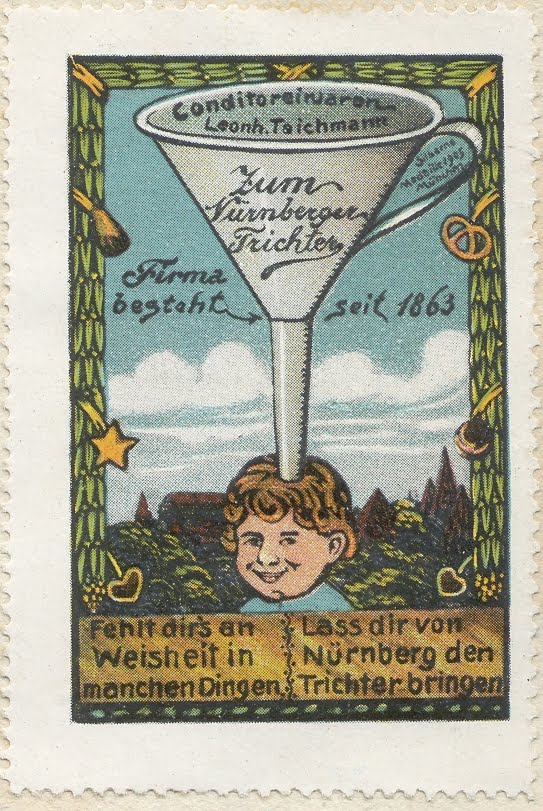Nuremberg Funnel on:
[Wikipedia]
[Google]
[Amazon]
 Nuremberg Funnel (German: Nürnberger Trichter) is a jocular description of a mechanical way of
Nuremberg Funnel (German: Nürnberger Trichter) is a jocular description of a mechanical way of
German First Day School Portraits: Funnel / Trichter
 Nuremberg Funnel (German: Nürnberger Trichter) is a jocular description of a mechanical way of
Nuremberg Funnel (German: Nürnberger Trichter) is a jocular description of a mechanical way of learning
Learning is the process of acquiring new understanding, knowledge, behaviors, skills, value (personal and cultural), values, Attitude (psychology), attitudes, and preferences. The ability to learn is possessed by humans, non-human animals, and ...
and teaching. On the one hand, it evokes the image of a student learning his lessons with this kind of teaching method almost without effort and on the other hand, a teacher teaching everything to even the "stupidest" pupil. It can also reference forceful teaching of someone's ideas, ideology, etc.
Etymology
The phrase "Nuremberg
Nuremberg (, ; ; in the local East Franconian dialect: ''Nämberch'' ) is the Franconia#Towns and cities, largest city in Franconia, the List of cities in Bavaria by population, second-largest city in the States of Germany, German state of Bav ...
Funnel", familiar in German-speaking countries, has its origin in the title of a poetics textbook by the founders of the Pegnesischer Blumenorden
The (English: Pegnitz Flower Society; Latin: ; abbr. P.Bl.O.) is a German literary society that was founded in Nuremberg in 1644. It is the sole Baroque literary society that remains active today. The name derived from the river Pegnitz, which fl ...
and the Nuremberg poet, Georg Philipp Harsdörffer
Georg Philipp Harsdörffer (1 November 1607 – 17 September 1658) was a Jurist, Baroque-period German poet and translator.
Life and career
Georg Philipp Harsdörffer was born in Nuremberg on 1 November 1607 into a patrician family. He studied ...
(1607–1658), which appeared in Nuremberg in 1647 under the title of ''Poetischer Trichter. Die Teutsche Dicht- und Reimkunst, ohne Behuf der lateinischen Sprache, in VI Stunden einzugießen'' (Poetic funnel. The art of German poetry and rhyme, without using the Latin language, poured in over VI hours). Because of the wide distribution of the work, the expression "Nuremberg funnel" became a common idiomatic expression.
The idiom "to funnel something in" (to drum something in) or "to get something funneled in" (to get something drummed in) is even older than the image of the "Nuremberg Funnel"; it was first recorded in the collection of proverbs by Sebastian Franck
Sebastian Franck (20 January 1499 Donauwörth, Swabia (Bavaria), Swabia – c. 1543 Basel, Switzerland) was a 16th-century Germany, German freethinker, humanism, humanist, and Radical Reformation, radical reformer.
Biography
Franck was born in 1 ...
in 1541, but without reference to the city of Nuremberg.See Lutz Röhrich
Lutz Röhrich (9 October 1922 – 29 December 2006) was a German folklorist and scholar studying topics relating to literature, oral stories, and similar types of media. He enjoyed a long and prestigious career, starting as a professor at the Phi ...
: ''Lexikon der sprichwörtlichen Redensarten. Band 3: Homer - Nutzen''. Freiburg, Basel, Vienna: Herder Verlag 1994, p. 1103
Literature
* Franz Kaiser: ''Der Nürnberger Trichter''. Illustrated by Emeli Werzinger. Nuremberg: Sebaldus-Verlag, 1946, 12 pages, IDN: 354205862. * Hans Recknagel; Rolf Veit: ''Wagenseils Nürnberger Trichter. Zur Geschichte einer Redensart''. In: Mitteilungen der Altnürnberger Landschaft e.V., Booklet 1, 2001, pp. 571–581. * Dagmar Hirschfelder: ''Der "Nürnberger Trichter" – Ein Allheilmittel gegen die Dummheit?'' In: KulturGUT – Aus der Forschung des Germanischen Nationalmuseums, booklet 8, 2006, pp. 3–5.External links
German First Day School Portraits: Funnel / Trichter
References